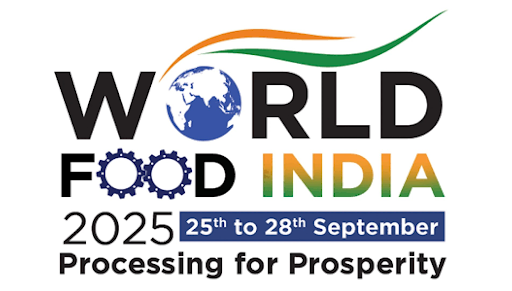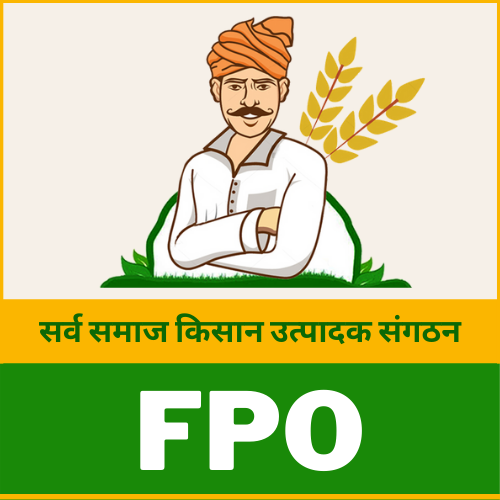
Disclaimer: Copyright infringement not intended.
Context
- Union Minister of State for Agriculture and Farmers Welfare inaugurated the Conference of Cluster-Based Business Organizations (CBBOs) and Farmer Producer Organizations (FPOs) under the Scheme of Formation and Promotion of 10,000 FPOs.
FPO
- FPO stands for Farmer Producer Organizations. FPO is an organization, where the members are farmers itself.
- Farmers Producers Organization provides end-to-end support and services to the small farmers, and cover technical services, marketing, processing, and others aspects of agriculture inputs.
- Farmer Producer Organization (FPO) is a legal entity incorporated under the Companies Act or Co-operative Societies Act of the concerned States.
- It is formed to leverage collectives through economies of scale in production and marketing of agricultural and allied sectors.
- The idea behind the Farmer Producer Organizations (FPO) was that:
“Farmers, who are the producers of their agriculture products, can form the groups and can register themselves under the Indian Companies Act”.
Details
- To facilitate the process, the Small Farmers Agribusiness Consortium (SFAC) was mandated by the Department of Agriculture and Cooperation, Ministry of Agriculture, Government of India, to support the State Government in the formation of the Farmer Producer Organizations (FPOs).
- The goal is to enhance the farmers’ competitiveness and to increase their advantage in emerging the market opportunities.
- The major operations of Farmers Producer Organization (FPO) include the supply of seed, machinery, market linkages & fertilizer, training, networking, financial and technical advice.
|
Small Farmers Agribusiness Consortium
Small Farmers Agribusiness Consortium (SFAC) is an autonomous society promoted by Ministry of Agriculture Cooperation and Farmers’ Welfare. SFAC is an exclusive society focused on increasing incomes of small and marginal farmers through aggregation and development of agribusiness. SFAC is progressing towards establishing an eco system for FPOs/FPCs to make them sustainable and viable in the long run. SFAC is also implementing the National Agriculture Market Electronic Trading (e-Nam) platform.
|
Features of FPO
- The FPOs are voluntary organizations controlled by farmer-members who actively participate in making decisions and setting policies.
- The FPOs are open to persons who are willing to accept the responsibilities of membership without social, gender, political, racial, or religious discrimination.
- The FPOs provide training and education for their farmer-members, managers, elected representatives, and employees to contribute to the FPOs development effectively.
- The FPOs are promoted and formed through the Cluster-Based Business Organisations (CBBO) and engaged at the cluster or state level by implementing the agencies.
- The FPOs are promoted under the ‘One District One Product’ to encourage better branding and specialisation, processing, marketing, and exports by the FPO.
- The FPOs provide hand-holding, adequate training, and the CBBOs give the initial training.
- Priority is given for the FPO formation in aspirational districts, with a minimum of one FPO in every block of the aspirational districts.
“FORMATION AND PROMOTION OF 10,000 FARMER PRODUCER ORGANIZATIONS(FPOS)” SCHEME
- In 2021, The Government approved and launched the Central Sector Scheme of “Formation and Promotion of 10,000 Farmer Producer Organizations(FPOs)” to form and promote 10,000 new FPOs till 2027-28.
Details
- Under the scheme, the formation and promotion of FPO is based on Produce Cluster Area approach and specialized commodity based approach.
- While adopting cluster based approach, formation of FPOs will be focussed on “One District One Product” for development of product specialization.
- Under the scheme, there is a provision for financial support of a maximum of Rs.18.00 lakh per FPO for 3 years as a management cost to make them sustainable and economically viable.
Objectives of the Scheme
- To provide a holistic and broad-based supportive ecosystem to form new 10,000 FPOs to facilitate the development of vibrant and sustainable income-oriented farming
- To enhance productivity through efficient, cost-effective and sustainable resource use and realize higher returns through better liquidity and market linkages for their produce and become sustainable through collective action
- To provide handholding and support to new FPOs up to 5 years from the year of creation in all aspects of management of FPO, inputs, production, processing and value addition, market linkages, credit linkages and use of technology, etc
Activities to be undertaken by FPO
As per the new guidelines, the FPOs may provide and undertake the following relevant major services and activities for the development:
- The FPO can supply quality production inputs like seed, fertilizer, pesticides at reasonably lower wholesale rates.
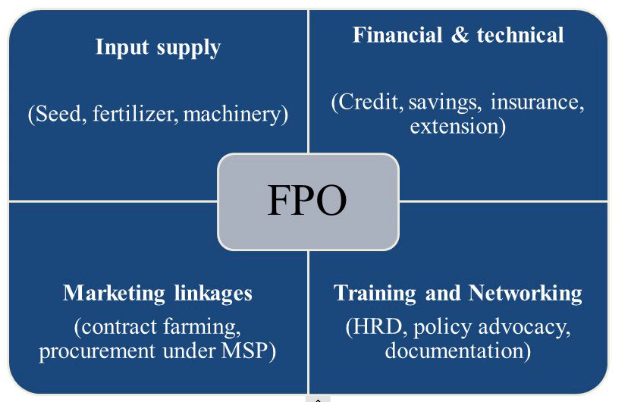
- FPO can make available need-based production and post-production machinery and equipment on custom hiring basis for members to reduce the unit production cost
- FPO can engage in the process of value addition like cleaning, grading, packing, and also farm level processing facilities at a user charge basis on a reasonably cheaper rate.
- The FPO can make the facility for storage and transportation for its members
- The FPO must undertake higher income-generating activities like seed production, beekeeping, mushroom cultivation, etc
- FPO needs to undertake aggregation of smaller lots of farmer-members’ produce; add value to make them more marketable.
- Facilitate logistics services such as storage, transportation, loading/unloading, etc. on a shared cost basis.
- FPO can market the aggregated produce with better negotiation strength to the buyers and in the marketing with better and remunerative prices.
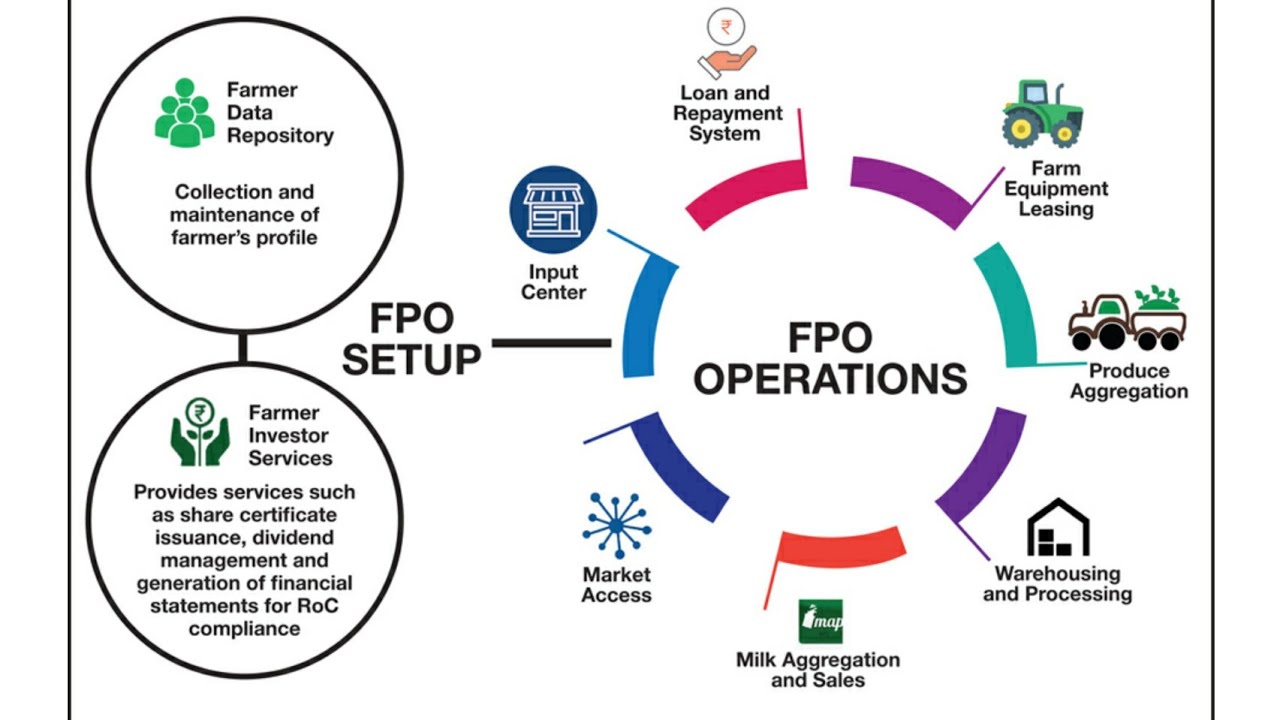
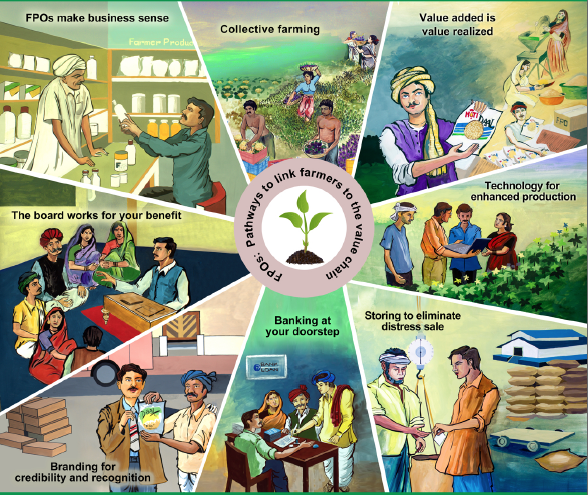
How is the government assisting the FPOs?
To motivate more and more farmers to set up FPOs, the government is providing a lot of assistance:
- Equity Grant Scheme
- Credit Guarantee Fund Scheme through SFAC.
- FPOs can also get help from the government of India for various schemes like marketing assistance, Venture Capital assistance.
- The mission for Integrated Development of Horticulture (MIDH) Scheme. This scheme works towards promoting agricultural business activities.
- The help to farmers is further strengthened by SFAC and NABARD that promote the training of the Board of Directors and their officers of FPOs so that they can function effectively.
- Besides, the Indian Council of Agricultural Research also provided technical support to FPOs via Krishi Vigyan Kendras established in the respective locations. The objective of all these initiatives is to help the farmers and motivate them towards FPOs.
Implementing Agencies to Form and Promote FPOs
The following three implementing Agencies will form and promote Farmer Producer Organizations
- Small Farmers Agri-business Consortium (SFAC)
- National Cooperative Development Corporation (NCDC)
- National Bank for Agriculture and Rural Development (NABARD)
Note: States may also if so desire, nominate their Implementing Agency in consultation with the Department of Agriculture.
Cluster-Based Business Organizations (CBBOs)
- The Department of Agriculture and Farmer Welfare will allocate Cluster to Implementing Agencies which in turn will form the Cluster-Based Business Organization in the States.
- FPOs will be formed and promoted through these Cluster-Based Business Organizations (CBBOs) and it will be a platform for an end to end knowledge for all issues in FPO promotion.
- The CBBOs will have five categories of specialists such as,
- The domain of Crop husbandry
- Agri marketing or Value addition and processing
- Social mobilization
- Law & Accounts and
- IT/MIS.
- Under the scheme, CBBOs have been provisioned with the critical role to engage themselves all along the value chain starting right from the
- Mobilization of farmers,
- Baseline survey,
- Identification of produce clusters, and formation of groups,
- Registration,
- Capacity building to the preparation of the business plan,
- Execution thereof with assurance to provide the market to the FPOS.
- They are also to establish a cardinal link with implementing agencies and FPOS.
Support by the National Project Management Agency (NPMA)
- There will be a National Project Management Agency (NPMA) at SFAC for providing overall project guidance, data compilation, and maintenance of FPO through integrated portal and Information management and monitoring.
Members of FPO
- FPO with a minimum farmer-members size of 300 shall be eligible under the scheme in plains, while in North-Eastern and Hilly areas* (including such other areas of UTs), a size of 100 shall be eligible for equity grant.
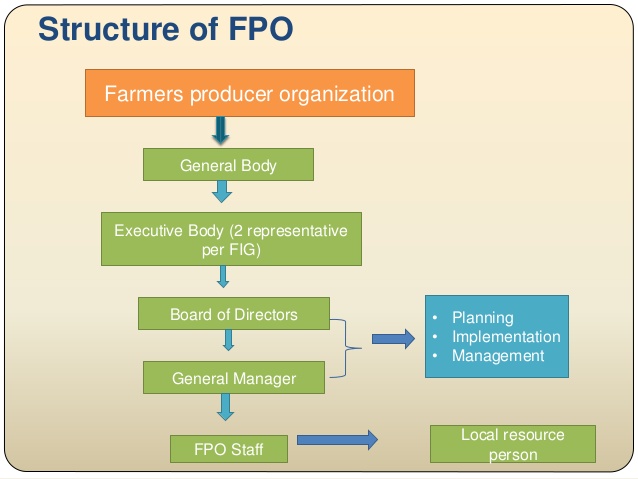
Priority for Aspirational Districts FPO
- According to the new guidelines, priority will provide for the formation of FPOs in Aspirational districts in India with at least one FPO in each block of Aspirational districts.
- FPOs will be promoted under the “One District One Product” cluster to promote specialization and better processing, marketing, branding and export by FPOs.
Equity Grant for FPO
- To strengthen the financial base of FPOs and help them to get credit from financial institutions for the projects and working capital requirements for business development, the Government is providing Equity Grant to FPO.
- To strengthen the financial base of FPOs, there is also a provision for a matching equity grant of a maximum of Rs. 2000/- per member with a ceiling of Rs. 15 lakh /FPO and Credit Guarantee facility up to a bankable project loan of Rs. 2.00 crore respectively.
Objectives of Equity Grant
The objectives of providing Equity Grant to FPO are as follows:
- To enhance the viability and sustainability of FPOs.
- To increase the creditworthiness of FPOs.
- To enhance the shareholding of members to increase the ownership and participation in the FPO.
- Equity Grant Details.
- Equity Grant will be in the form of a matching grant up to Rs. 2000 per farmer member of FPO subject to a maximum limit of Rs. 15 lakh fixed per FPO.
Eligibility criteria of FPO
An FPO fulfilling the following criteria are eligible to apply for equity grant under the Formation and Promotion of 10,000 Farmer Producer Organization (FPO) Scheme:
- The FPO should be a legal entity as mentioned above.
- FPO has raised equity from its Members as laid down in its Articles of Association/ Bye-laws.
- Minimum 50% of the FPO’s shareholders are small, marginal, and landless tenant farmers and Women farmers’ as shareholders are to be preferred.
- The maximum shareholding of the members should not be above 10% of the total equity of the FPO.
- A farmer can be a member in more than one FPO with different produce clusters but he/she will be eligible only once for the matching equity grant up to his/her share.
Benefits of FPO
- Declining average land-holding size: The small and marginal farmers share increased from 70% in 1980-81 to 86% in 2015-16. The FPOs can engage farmers in addressing productivity issues, collective farming and emanating from small farm sizes. It may also result in additional employment generation because of the increased intensity of farming.
- Negotiating with corporates: The FPOs can benefit farmers to compete with large corporate enterprises in bargaining. It allows farmer members to negotiate as a group and help small farmers in both output and input markets.
- Economics of aggregation: The FPOs can provide quality and low-cost inputs to member farmers such as the purchase of machinery, loans for crops, input agri-inputs (pesticides, fertilisers, etc.) and direct marketing after agricultural produce procurement. It will enable members to save time, distress sales, transaction costs, price fluctuations, quality maintenance, transportation, etc.
- Social impact: Social capital will develop in FPOs, improving women farmers’ decision-making and gender relations in the FPOs. It will enhance food, reduce social conflicts and nutritional values in the community.
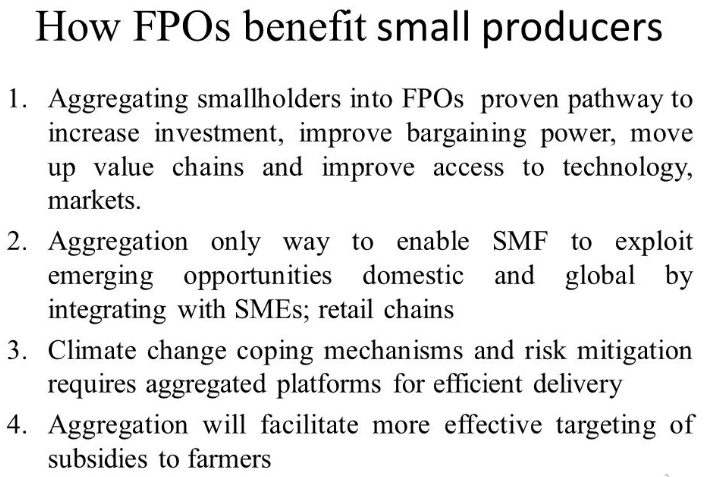
- Better Efficiency: The farmers/producers have skill and expertise in producing. However, they generally need support for marketing of what they produce for which the Producer Company will basically take over the responsibility right from procurement of raw material to delivery of the final product at the ultimate consumers’ doorstep.
- More Income to Producer: Farmer Producer Company shall reduce the overall cost of production by purchase of inputs on bulk and then sell/market the produce in bulk thus, fetching better price per unit of produce.
- Equal Voting Rights to Members: The voting rights shall be based on “one vote per member” and in case of Producer Company consisting only of producer institutions, then the voting rights shall be based on the participation in the business.
- Limited liability: The liability of the members is limited to the unpaid amount of the shares held by them. Hence, the private assets of the members are not liable losses incurred by company.
- Financial Assistance from Company: The Board of Farmer Producer Organization may, subject to provisions in articles, provide financial assistance to the members of the Producers company by way of credit facility and loans and advances.
- Platform for Government Initiatives: It can work as a platform to facilitate better access to government services, like PDS, MNREGA, Scholarships and Pensions, etc. It can liaison with the Government Departments for convergence of programmes, like drinking water, sanitation, health and hygiene.
- Entitled for Insurance: The Company can avail insurance for the producers or their primary produce to indemnify against any risk of losses.
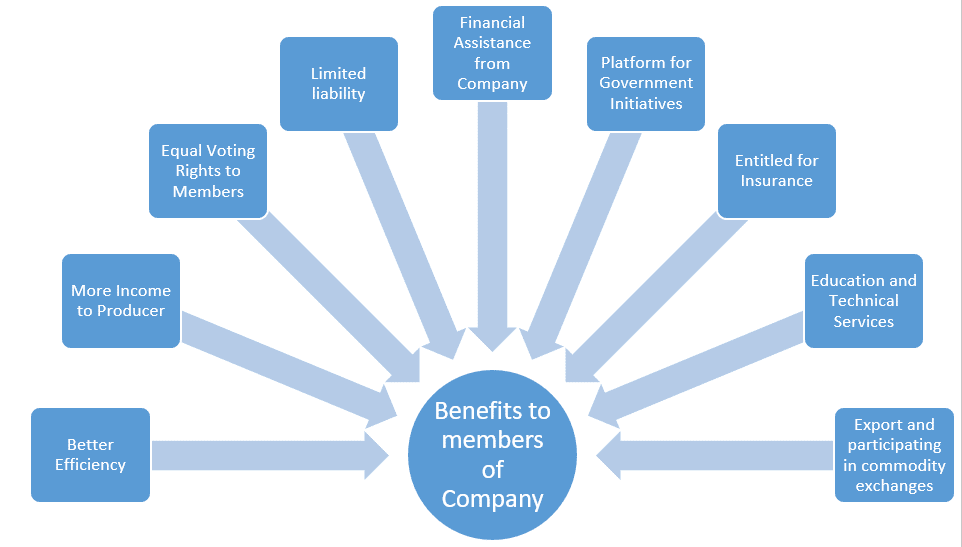
- Education and Technical Services: Producer Company shall help producer in brand building, Packaging, Labelling, Standardization, Quality control, providing storage facility and provide such training and services as it may deem fit.
- Export and participating in commodity exchanges: Farmers can export their agricultural produce as well as can aggregate the produce of its members, and sell it using the commodity exchanges agricultural produce.
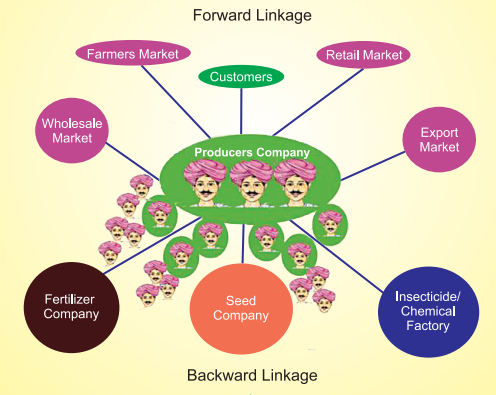
Benefits to Farmers in a nutshell,
- Through the formation of FPOs, farmers will have better collective strength for better access to quality input and technology.
- The farmer will also avail better credit and better marketing access through economies of scale for better realization of income.
- Cost of production can be reduced by procuring all necessary inputs in bulk at wholesale rates
- Aggregation of produce and bulk transport reduces marketing cost, thus, enhancing net income of the producer
- Building the scale through produce aggregation enables to take advantage of economies of scale and attracts traders to collect produce at farm gate.
- Post-harvest losses can be minimized through value addition and efficient management of value chain.
- Regular supply of produce and quality control is possible through proper planning and management.
- Price fluctuation can be managed; if there are practices like contract farming, agreements, etc.
- Easy in communication for dissemination of information about price, volume and other farming related advisories.
- Access to financial resources against the stock, without collaterals.
- Easy access of funds and other support services by the government / donors / service providers, and
- Improved bargaining power and social capital building.
Performance of FPOs
- Experience shows a mixed performance of FPOs in the last decade. Some estimates show that30 percent of these are operating viably while 20 per cent are struggling to survive.
- The remaining 50 per cent are still in the initial phase of mobilisationand business planning.
- FPOs in Gujarat, Maharashtra and Madhya Pradesh, Rajasthanand some other states have shown encouraging results and have been able to realise higher returns for their produce.
- For example, tribal women in the Pali district of Rajasthan formed a producer company and they are getting higher prices for custard apples.
- NABARD has undertaken a field study on the benefits of FPOs in Punjab and Madhya Pradesh. The study shows that in nascent FPOs, the proportion of farmer members contributing to FPOs activities is 20-30 per centwhile for the emerging and mature FPOs it is higher at about 40-50 percent.
- In Maharashtra, some of the FPOs have organically evolved (OFPOs) when farmers have taken the lead to adopt market-oriented practices, develop cost-effective solutions in production and marketing.
- Goa, Gujarat, Maharashtra, and Rajasthan are implementing schemes under which 894 produce clusters have been allocated and 563 FPOs registered, more than 1.35 lakh farmers have been mobilized and about 56,012 farmers have been registered as shareholders of the FPOs.
- 30 women-focused FPOs have been registered. 64 FPOs registered in tribal districts and 85 FPOs registered in aspirational districts.
Challenges
Studies of NABARD show that there are some important challenges for building sustainable FPOs.
Some of these are:
- Lack of technical skills,
- Inadequate professional management,
- Weak financials,
- Inadequate access to credit,
- Lack of risk mitigation mechanism and
- Inadequate access to market and infrastructure.
Way Forward
- Issues such as working capital, marketing, infrastructurehave to be addressed while scaling up FPOs.
- Getting credit is the biggest problem. Banks must have structured products for lending to FPOs. These organizations lack professional management and, therefore, need capacity building.
- They have to be linked with input companies, technical service providers, marketing/processing companies, retailers
- They need a lot of data on marketsand prices and other information and competency in information technology.
- FPOs can be used to augment the size of the landby focusing on grouping contiguous tracts of land as far as possible — they should not be a mere grouping of individuals. Women farmers also can be encouraged to group cultivate for getting better returns. FPOs can also encourage consolidation of holdings.
- In order to build a sustainable FPO, favorable ecosystem is needed besides certain policy reforms particularly in the agricultural marketing systems. Some of the critical ecosystems include:
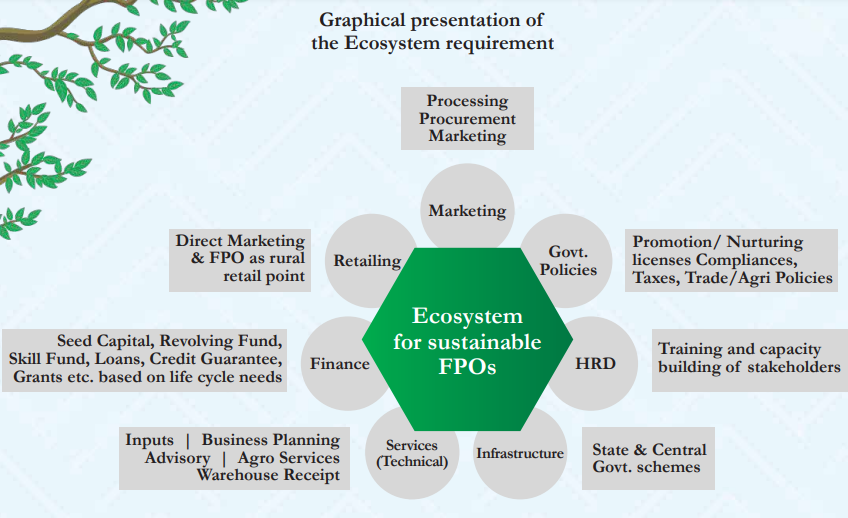
Building of robust FPO movement requires mass awareness creation among farmers/ various other stakeholders and initiating critical reforms to strengthen the FPO ecosystem, as suggested below:-
- Based on National policy of DAC & FW, State Governments may adopt appropriate policy to support, and strengthen FPOs so as to make them self-sustaining and commercially viable business enterprises.
- Strengthening rural agri-marketing infrastructure, promoting unified market for agri produce and enabling FPOs market their produce directly to the consumers/ bulk-buyers, without payment of mandi fee.
- FPOs need to be linked to Gramin Agri Markets (GrAMs) for its operation and management.
- The system of issuing various licenses required for undertaking business activities by FPOs may be simplified to make it a single window state-wide license.
- With a view to increasing farmers’ participation in agri exports, APEDA may identify suitable clusters of production, processing and export of potential crops through FPO route and provide necessary infrastructure & handholding for ensuring consistency in quantity, quality and traceability of exportable agricultural commodity.
Conclusion
- To conclude, FPO seems to be an important institutional mechanismto organize small and marginal farmers. Aggregation can overcome the constraint of small size.
- The real hope is in farmer producer organizations (FPOs) that allow members to negotiate as a groupand can help small farmers in both input and output markets.
- The FPOs have to be encouraged by policy makers and other stakeholders apart from scaling up throughout the country to benefit particularly the small holders.
- While small farmers gain greater bargaining power through FPOsin relation to the purchase of inputs, obtaining credit and selling the produce, the fundamental problem of the small size of holdings giving only a limited income is not resolved.
- While incomes will rise because of the benefits flowing from FPOs, they may not still be adequate to give a reasonable incometo small and marginal farmers. That issue has to be handled separately.
- Since the FPO has been considered to be the way forward for enhancing farmers’ income and boosting agricultural growth, future strategies for scaling up of FPO promotion by various stakeholders may focus on the following broad areas of critical support/ effective interventions;
- Mass awareness building.
- Institution development.
- Forging linkages with the ecosystem, and
- Digital monitoring.
https://www.pib.gov.in/PressReleasePage.aspx?PRID=1823280














